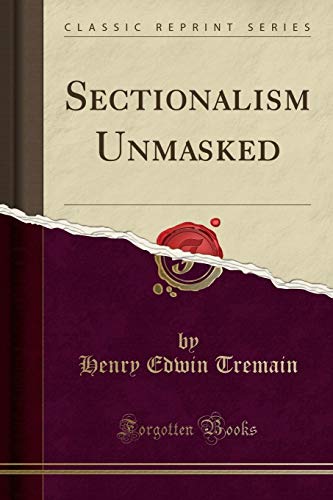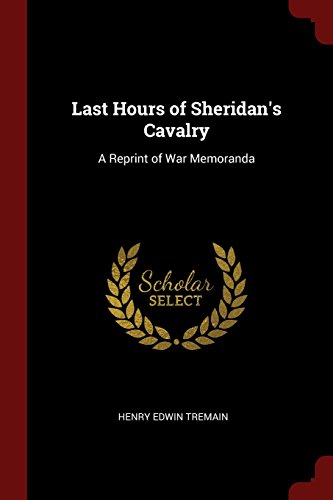Background
Henry was the son of Edwin Ruthven and Mary (Briggs) Tremain. He was born on November 14, 1840 in New York City.
He was a descendant of Joseph Truman, who settled in New London, Connecticut, in 1666.



(Excerpt from Sectionalism Unmasked Copy of Republican Cl...)
Excerpt from Sectionalism Unmasked Copy of Republican Club's Observations that were made Public upon the Introduction of the First Reduction Bill in the Fifty eighth Congress - Explanation of its Basis and Table giving Figures Respecting same - Memorandum Respecting same. About the Publisher Forgotten Books publishes hundreds of thousands of rare and classic books. Find more at www.forgottenbooks.com This book is a reproduction of an important historical work. Forgotten Books uses state-of-the-art technology to digitally reconstruct the work, preserving the original format whilst repairing imperfections present in the aged copy. In rare cases, an imperfection in the original, such as a blemish or missing page, may be replicated in our edition. We do, however, repair the vast majority of imperfections successfully; any imperfections that remain are intentionally left to preserve the state of such historical works.
https://www.amazon.com/Sectionalism-Unmasked-Classic-Reprint-Tremain/dp/1331119812?SubscriptionId=AKIAJRRWTH346WSPOAFQ&tag=prabook-20&linkCode=sp1&camp=2025&creative=165953&creativeASIN=1331119812

( This work has been selected by scholars as being cultur...)
This work has been selected by scholars as being culturally important, and is part of the knowledge base of civilization as we know it. This work was reproduced from the original artifact, and remains as true to the original work as possible. Therefore, you will see the original copyright references, library stamps (as most of these works have been housed in our most important libraries around the world), and other notations in the work. This work is in the public domain in the United States of America, and possibly other nations. Within the United States, you may freely copy and distribute this work, as no entity (individual or corporate) has a copyright on the body of the work. As a reproduction of a historical artifact, this work may contain missing or blurred pages, poor pictures, errant marks, etc. Scholars believe, and we concur, that this work is important enough to be preserved, reproduced, and made generally available to the public. We appreciate your support of the preservation process, and thank you for being an important part of keeping this knowledge alive and relevant.
https://www.amazon.com/Last-Hours-Sheridans-Cavalry-Memoranda/dp/1375629557?SubscriptionId=AKIAJRRWTH346WSPOAFQ&tag=prabook-20&linkCode=sp1&camp=2025&creative=165953&creativeASIN=1375629557
Henry was the son of Edwin Ruthven and Mary (Briggs) Tremain. He was born on November 14, 1840 in New York City.
He was a descendant of Joseph Truman, who settled in New London, Connecticut, in 1666.
After preliminary education in the public schools he attended the College of the City of New York and was graduated with the B. A. degree in 1860. He then entered Columbia University Law School, but his course was interrupted by service in the Civil War and he received the LL. B. degree in 1867.
In April 1861 he enlisted as a private in the 7th New York State Militia. On the return of the regiment from Washington, he resigned to recruit the 73rd New York Volunteers in which he was commissioned first lieutenant in August 1861.
Under McClellan and Pope he participated in the Virginia campaigns of the Army of the Potomac and was mentioned for gallantry at Williamsburg and Malvern Hill. Taken prisoner while leading a counter attack at the second battle of Bull Run, he was confined in Libby Prison for a short time. He resumed duty as aide-de-camp to Daniel E. Sickles, and rendered notable staff service in the battles of Fredericksburg, Chancellorsville, and Gettysburg. He was also a favorite staff officer of Joseph Hooker.
In 1864 he accompanied Sickles to the West to inspect all armies in the field. Upon his return he rejoined the Army of the Potomac, and participated as a staff officer in all battles to Appomattox. He was appointed captain in 1862, major and aide-de-camp in 1863, and brevetted lieutenant-colonel on Mar. 13, 1865, "for gallant and meritorious service. " He became a colonel in June and a brigadier-general in November 1865. He served in South Carolina until his discharge in 1866.
Immediately after his return to New York in 1868 he began his career at the bar. He was unsuccessful in his candidacy for justice of the court of common pleas in the following year, but maintained an active interest in politics and public law. As special counsel to the United States marshall in 1870 he prosecuted violations of the election laws, and participated in attacks upon the "Tweed ring. " From 1873 to 1877 he was first assistant United States attorney in New York, and thereafter appeared as counsel in the federal courts in cases involving revenue law violations. He joined Joshua T. Owen in 1872 in establishing the New York Law Journal, a daily devoted to news of the courts.
He served as editor for two years, but relinquished the post because of the pressure of his legal duties. He showed deep interest in the associations made by the War. He was president of the Society of the Army of the Potomac, 1902, colonel of the Veterans of the 7th N. Y. N. G. , and president of the III Army Corps Union.
Besides many papers on law, tariff, and taxation he wrote: Last Hours of Sheridan's Cavalry (1904); Two Days of War (1905); Sectionalism Unmasked (1907); and Fifty Papers, Addresses and Writings (1909).
He died on December 9, 1910.
(Excerpt from Sectionalism Unmasked Copy of Republican Cl...)
( This work has been selected by scholars as being cultur...)
He was twice president of the National Republican Club and, from 1870 to 1874, president of the alumni association of the College of the City of New York.
He was married to Sarah Brownson, of New York City, on June 1, 1869. They had no children.
